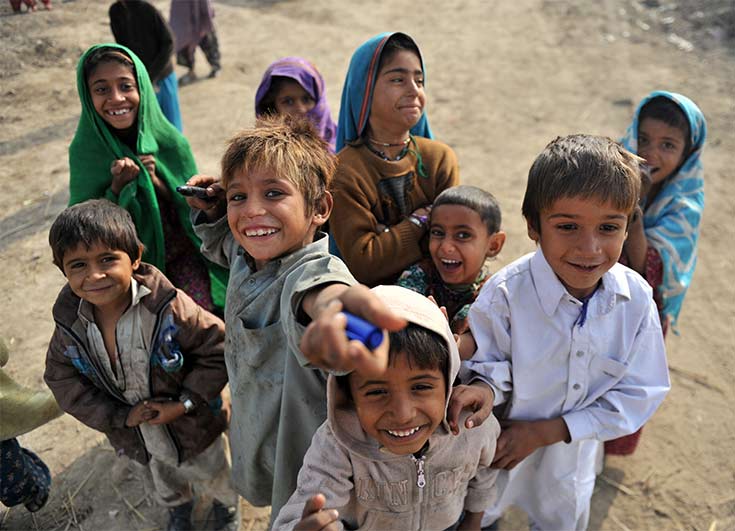Count every child: Finding and registering Pakistan's invisible children
Luavut Zahid, our Pakistan Correspondent and Blog Editor, commissioned this piece because: “Pakistan has a real problem in terms of child protection mechanisms. Child registration is a large part of how a child can fall through the cracks and not get access to adequate health or educational resources.
“Apart from this, it is so much easier to abuse and harass such children. The author has an interesting insight into the situation in Pakistan, and why it needs immediate attention.”

(Image: Shutterstock/Thomas Koch)
In Pakistan, around 60 million children do not have a legal identity because of a birth registration issue. UNICEF estimates suggest that each year around 4.5 million children are born in Pakistan, and around three million end up not being registered.
I remember the day in the spring of 2007 when I took charge as Regional Project Officer (RPO) of Universal Birth Registration (UBR) in Plan International, an international not-for-profit organisation. This was my first experience working for children’s right to have an identity.
The project’s aim was to streamlines the birth registration process by enhancing the functioning capacity. It aimed to increase the birth registration rate to maximum levels. It planned to do so by helping build the capacity of the Secretaries Union Councils (UCs) and creating awareness about the importance of birth registration.
Over a period, the project increased birth registrations from eight per cent to 32 per cent in both the pilot districts.
Why birth registration?
This is the critical first step towards ensuring the rights of a child. Without a valid birth certificate, a child might not be eligible to attend school or be vaccinated against fatal diseases. In addition, birth certification also provides proof of age therefore sheltering children from the menace of child marriages, early recruitment to the armed forces, and even reunites them with their families during natural calamities.
A detailed technical analysis regarding the Civil Registration and Vital Statistics (CRVS) was conducted by my organisation. The analysis concluded a variety of findings pertaining to birth registration
Several barriers were identified through the study including unwillingness or inability of Pakistani citizens to travel to their local UCs to register a birth, as well as ignorance of the importance and benefits of registration. Further, hospitals are not equipped to offer registration services, which further complicates matters.
The complexity of the registration process was one reason why many citizens do not go through with the process. The sluggish process meant citizens had to endure an astonishing legal processing time of 60-days, which directly pointed at the unreliability of the registration service.
The availability of quality data is always questionable, for example the birth registration data gathered at Union Councils is not always transferred to the central CRVS database; when it is, it is done through manual processes, no vital statistics are derived from birth registration data and the data that is available is poor.
The institutions are available but the service delivery always depends upon their capacity – the unreliability of both the UC’s infrastructure and secretaries is an ever-present problem. Owing to lack of training and resources, many more issues are created than resolved.

A new integrated birth registration system is being planned, bringing in key stakeholders and departments, to ensure that all children are given an identity and therefore access to the systems that protect and educate them (Zahid Rana Sohail/123rf)
To ensure the rights of the citizens it is mandatory for the service providers to ensure the fulfillment of the rights of every citizen through the modification of related laws such as Local Government By-Laws, which require a range of personal, and potentially discriminatory fields for birth registration, deterring and endangering citizens, eg name of father and religion. In one province, the laws have been modified, while the rest of the provinces are yet to work on this. In addition, gender bias results in more boys within communities.
A way forward: Digital birth registration
To address the issues at ground level there is dire need of an integrated project/programme, which ensures 100 per cent registration of newborns at a community level. Plan International is initiating an innovative Digital Birth Registration (DBR) project, which aims to overcome the issues and barrier of birth registration in Pakistan.
The project will not be implemented in isolation but it will bring on board the key stakeholders/departments including local government, health, and the National Database and Registration Authority (NADRA) to ensure the sustainability of the project in the long run.
The DBR project not only focuses on the technical component – which includes the designing of mobile phone application (software), to be provided to the Lady Health Workers (LHWs) – but it also includes the most vital component, Communication for Behavioural Impact (COMBI). This will address the behaviours of parents who are not willing to go get their child’s birth registered and collected in the form of certificates.
The COMBI component of the project will help increase the demand side of the birth registration at community level.
This integrated programme will allow all children to be counted and help give them an identity and make them visible to other systems.
Zahid Jalbani is a Senior development practitioner and works as Project Manager-DBR, Plan International. He is based in Islamabad, Pakistan. Contact him here
Luavut Zahid, 21/04/2016